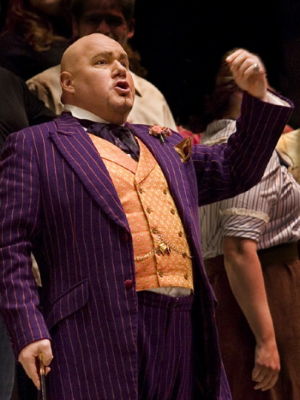|

A Musical Gem
Donizetti's 'L'elisir d'amore',
enjoyed by MARIA NOCKIN
In 1797, Gaetano Donizetti, the composer of L'elisir d'amore, was born to an extremely poor family living outside of the city of Bergamo in what is now Italy. Although his family was not musical, he had the good fortune to study with opera composer, Johann Simon Mayr, who was the maestro di cappella at the local cathedral. Mayr saw that Donizetti got a basic education and eventually sent him to Bologna for further study.
As a result of his connection with Mayr, Donizetti began to compose church music, but eventually tried every type of opera popular in the early part of the nineteenth century. He succeeded in both comedy and tragedy and, although he was the target of many jealous rivals, contemporary writings note that he maintained a pleasant demeanor and ready wit. His first huge success, Anna Bolena, was premièred in 1830. After that, star singers Giuditta Pasta and Giovanni Rubini began to champion his music wherever they went.
In 1832, when another composer was not able to produce the opera for which he had a commission, Donizetti told the manager of Milan's Teatro Canobbiana that he could produce an opera in two weeks if he were given the right librettist. Together with Felice Romani, he wrote L'elisir d'amore within the agreed fourteen day period. Romani did not write an original text, however; he based his Italian work on the French libretto that Eugène Scribe wrote for Daniel Auber's Le Philtre. Scribe based his work on Silvio Malaperta's Il Filtro. Donizetti would compose grand operas to French texts later, among them La fille du régiment (1840), but in 1832 he was still writing for Italian theaters.
On 17 January 2009, Arizona Opera presented L'elisir d'amore with an international cast of singing actors. The production, which is owned jointly by Opera Colorado, Boston Lyric Opera, San Francisco Opera, Michigan Opera Theatre and Fort Worth Opera, was new to the Arizona audience. Director James Robinson updated the time to circa 1914 and changed the locale to a small town in the Napa Valley of California.
The single set by Allen Moyer consisted of a band shell in a spacious park, which could also accommodate Nemorino's ice cream truck and Dulcamara's traveling medicine show. Jennifer Nicoll staged the simple but effective show in Arizona. The costumes by Martin Pakledinaz were authentic for the pre-World War I period. Most of the wearing apparel was detailed and fit the wearer well. The notable exception was Adina's Act I dress which was overly plain and rather tight.
British tenor Barry Banks is justly famed for his interpretation of bel canto roles, and he proved once again that he can act and sing florid music with amazing accuracy at the same time. He created a lovable character as Nemorino, the ice cream man, all the while rendering Donizetti's difficult music with seeming ease. He was a hilarious drunk, and he sang a ravishingly beautiful 'Una furtiva lagrima'.
Soprano Dina Kuznetsova, who was born in Russia but lives in the United States, was a coquettish, temperamental Adina. She sang with a compelling sound, crisp, accurate coloratura, elegant runs and interesting dynamics. Her confidant, Gianetta, was sung by Tammi Huber, who sings Adina for Arizona Opera's studio outreach company. Her large, pleasant voice would seem to have some possibilities for the future.

Kevin Glavin as Dulcamara. Photo © 2009 Tim Fuller
|
Kevin Glavin, an American bass with an enormous voice, dominated the stage with his personality. As the quack medicine man, Dulcamara, he managed to sell the townspeople plain red wine packaged as love potions and elixirs that were supposed to cure all sorts of ailments. Canadian baritone Hugh Russell was a suitably conceited, overbearing Belcore who took for granted that Adina would want nothing more than to marry him. He sang with a well-projected baritone voice.
Conductor Joseph Rescigno made his début at this performance, and it may have been his unfamiliarity with the Tucson Music Hall that caused him to allow the orchestra to cover the singers' voices at the beginning of each act. Once he adjusted the volume, the performance was a musical gem played at the brisk or romantic tempi that the score called for. Julian Reed's chorus had a few wild moments, but they maintained their harmonies for the most part and acted as individual townspeople.
A light, humorous opera, Elisir provided the audience with a very enjoyable evening.
Copyright © 3 February 2009
Maria Nockin, Arizona USA

|

